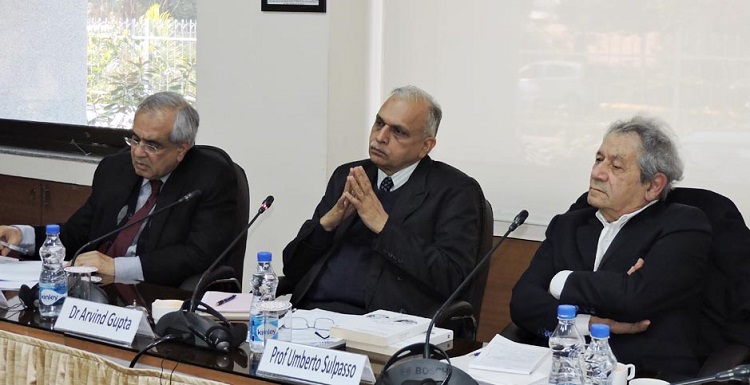

The Vivekananda International Foundation organized a talk by Professor Umberto Sulpasso on 18 December 2017 on Global Domestic Knowledge Product (GDKP) and its significance to India. The other panellists were Dr Rajiv Kumar (Vice-Chairman, NITI Aayog), Mr Tanmoy Chakraborty (Senior Vice President, Tata Consultancy Services) and Ambassador KP Fabian. Some of the salient points raised are enumerated below.
Role of GDKP
Communications revolution has made the enormous economic disparities highly visible through TV, internet, satellite programs and other digital connections. These disparities could easily provoke rebellion, destruction, violence engineered from outside into mass violence and global wars. However, the same communications revolution has broken the elitist ceiling of knowledge into mass production of knowledge and facilitated its widespread circulation. This has necessitated the formulation of new economic models that promote diffusion of knowledge items within the total population for sustainable future growth. The GDKP concept identifies four components of knowledge based economy, namely, R&D and technology, computer infrastructure, information infrastructure and education and training. GDKP aims to enhance GDP and proper role of private investment. The massive success of Facebook, Microsoft and Alphabet also indicates that the new companies that will become successful start-ups will sell knowledge and not goods.

Four Basic Pillars of GDKP
1. Knowledge items (Ki) - identification of both modern and local distinct culture knowledge items in distinct categories.
2. Country’s Knowledge Producing Matrix (CKPM) - comparison of knowledge produced by government, private institutions, and households as a differentiated way to impact on the GDP.
3. Country’s Knowledge User Matrix (CKUM) – value of knowledge bought by individuals and private companies as a way to measure their modernization efforts.
4. Cost of Learning – similar to cost of living to be used as a political reference for government budgeting decisions through education family bonds, education credit card etc. to support young citizens.
GDKP for India
GDKP will allow calculation of the value of specific knowledge items related to national culture produced and how these items change over time. In India, for examples, these specific knowledge items include the proliferation of cultural and religious teaching (yoga, Veda, and dance schools), religious festivals, and harvest festivals. GDKP can also facilitate the creation of a National Knowledge Education Platform. It will also enhance GDP and proper role of private investment with direct benefits to Indian economy like software, publishing etc.
Shortcomings of GDKP
GDKP offers no tangible indicators of progress in healthcare, agriculture, defence manufacturing which are prominent priorities for India. However, a pilot study may help plug in these gaps and build the way ahead.
Links:
[1] https://www.vifindia.org/event/report/2018/january/04/talk-by-professor-umberto-sulpasso
[2] http://www.facebook.com/sharer.php?title=Talk by Professor Umberto Sulpasso on 'Gross Domestic Knowledge Product' in the context of India&desc=&images=https://www.vifindia.org/sites/default/files/DSCN0367.JPG&u=https://www.vifindia.org/event/report/2018/january/04/talk-by-professor-umberto-sulpasso
[3] http://twitter.com/share?text=Talk by Professor Umberto Sulpasso on 'Gross Domestic Knowledge Product' in the context of India&url=https://www.vifindia.org/event/report/2018/january/04/talk-by-professor-umberto-sulpasso&via=Azure Power
[4] whatsapp://send?text=https://www.vifindia.org/event/report/2018/january/04/talk-by-professor-umberto-sulpasso